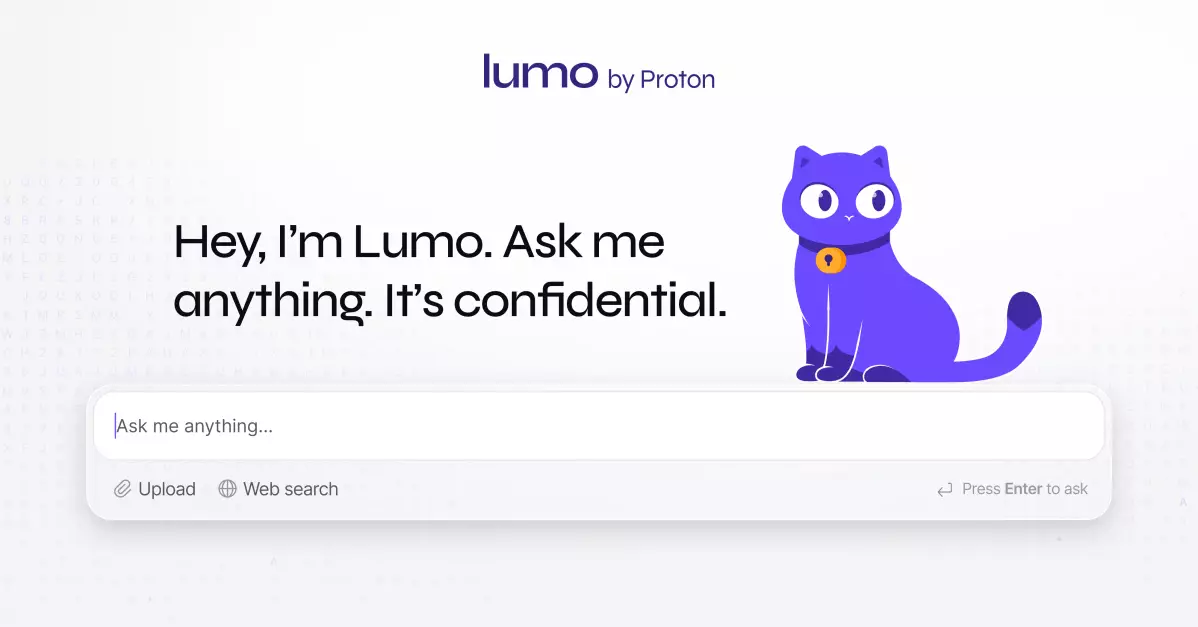In an era where artificial intelligence is increasingly intertwined with vast data harvesting, Proton’s new AI assistant, Lumo, dares to stand apart. Unlike the widely adopted AI models powered by some of the tech giants—who monetize every interaction—Lumo emerges as a beacon of privacy-conscious innovation. Proton’s bold assertion that Lumo operates with “zero-access” encryption on user devices signifies a fundamental shift away from the exploitative practices of surveillance capitalism. This approach not only prioritizes user privacy but also challenges the narrative that AI must inevitably compromise personal data. By embedding encryption directly into local storage, Proton drives a compelling message: privacy is compatible with advanced AI capabilities.
What makes Lumo truly stand out is its insistence on decentralizing control. The model’s design ensures that sensitive information remains within the user’s hands, preventing any third-party interference—be it corporations, governments, or malicious actors. By leveraging open-source models hosted in Europe, Proton further democratizes AI technology, advocating transparency over proprietary secrecy. This model represents more than a mere product; it positions itself as a philosophical alternative to the surveillance-driven AI models that dominate the tech landscape.
Deterring the Surveillance Economy: Lumo’s Bold Defiance
The current AI landscape is dominated by giants who see data as the new oil. Big Tech companies relentlessly pursue user data to enhance targeted advertising and fuel proprietary AI systems—often at the expense of privacy rights. Proton’s Lumo challenges this status quo head-on. CEO Andy Yen’s assertion that “Big Tech is using AI to supercharge the collection of sensitive user data” highlights the dystopian undercurrent of current AI development. In contrast, Proton’s stance is crystal clear: AI should empower, not exploit.
By ensuring that all data—be it document summaries, code snippets, or email drafts—resides locally, Proton effectively avoids the shadows cast by data breaches and misuse. Even when users opt to enable web search, Proton emphasizes privacy-friendly search engines and keeps the default setting off. This cautious approach amplifies the idea that secure AI shouldn’t be an afterthought but a fundamental feature.
This model’s opposition to data commodification resonates strongly in a climate where consumer trust is waning. Lumo’s architecture sends a powerful message: AI can be both useful and respectful of user consent. This is a significant step for the industry, indicating a potential shift where privacy becomes a core feature rather than a second thought.
The Technical and Ethical Significance of Privacy-First AI
What elevates Lumo from a simple chatbot to a potential paradigm shift is its commitment to transparency and open-source foundations. Powered by a blend of models such as Mistral’s Nemo, Nvidia’s OpenHands, and AI from the Allen Institute, Lumo demonstrates a diverse and adaptable AI ecosystem. This multi-model approach ensures high-quality responses but also signals an important philosophical stance: AI development should be collaborative, transparent, and inclusive.
Furthermore, Proton’s detailed privacy measures—like encrypted chat histories, file uploads that remain end-to-end encrypted, and configurable web search—set a new benchmark. These features don’t just serve marginal privacy concerns; they address ethical imperatives in a world where AI tools are becoming ubiquitous. If AI models are to be repositories of sensitive personal information, then ensuring that they operate without risking exposure is not just idealistic—it is essential.
Lumo’s architecture implicitly questions whether current privacy standards meet modern needs. Its design illustrates that AI can be more than a tool for efficiency; it can be an instrument of empowerment, giving individuals control over their data. This shift could influence regulatory frameworks, encouraging stricter data protection laws and broader adoption of privacy-preserving technologies.
The Future of Privacy-Centric AI and Its Broader Impact
Lumo’s introduction signals more than just a new product launch; it indicates a potential redefinition of how AI should operate in society. As users become increasingly aware of how their data is exploited, demand for privacy-respecting AI will grow. Proton’s stance demonstrates that it’s possible to develop powerful AI tools without sacrificing user rights, setting a precedent for the industry.
However, this approach isn’t without its challenges. Balancing functionality and privacy requires robust infrastructure and continuous innovation. Ensuring that AI models are capable of delivering high-quality responses from local data, while maintaining speed and responsiveness, demands significant technical resources. Moreover, convincing users of the security guarantees promised by “zero-access” encryption requires ongoing transparency and education.
In the broader context, Proton’s Lumo could influence policy discussions and industry standards, prompting a renaissance in privacy-centered AI development. Its success might encourage other companies to reconsider their approach, leading to a more ethical AI ecosystem grounded in user sovereignty. Ultimately, Lumo embodies not just a technological advancement but an ethical stance that positions privacy at the core of AI evolution.

